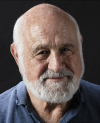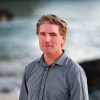How Humans Came to Construct Their Worlds
Michael Arbib, University of California, San Diego
Ricarda Braun, German Archaeological Institute
Summary:
At a global level, Homo sapiens have reshaped the planet Earth to such an extent that we now talk of a new geological age, the Anthropocene. But each of us shapes our own worlds, physically, symbolically, and in the worlds of imagination. This symposium focuses especially on one form of construction, the construction of buildings, while stressing that such construction is ever shaped by diverse factors from landscape to culture and the construction of history embodied in it - and more. After a brief look at birds building their nests as an example of variation on a species-specific Bauplan, we sample a broad sweep of cultural evolution and niche construction from the earliest stone tools of Neanderthals and Homo sapiens through the Neolithic and the rise of cities to the formal and informal architecture of the present day. Finally, we explore the ways artificial intelligence may further change how humans construct their mental and physical worlds.
Learn more about the celebrated design of our venue, the Salk Institute for Biological Studies, itself a marvel of human construction.
Media for each talk can be played by clicking on icons in the table below, or by clicking on the individual talk titles below and then the attachment file at the bottom of the page.
| Speakers | Media | Session |
|---|---|---|
 Pascal Gagneux  Ricarda Braun |
|
Welcome & Opening Remarks Welcome by CARTA Executive Co-Director, Pascal Gagneux. Opening remarks by Event Co-chair, Ricarda Braun. |
 Susan Healy |
|
Bird nests: Adaptive variation on innate Bauplans To provide a novel perspective on architecture, the meeting opens with a discussion of the construction of bird nests as a model for human construction (of buildings, drawing and language) – a case for this approach has been offered by (Arbib, Fragaszy, Healy, & Stout, 2023). As distinct from the buildings of termites (interesting though these are), bird nests offer a more apropos point of comparison for human buildings – they are conducted by single vertebrate (or a few) and can be... read more |
 Larry Barham |
|
Combinatorial technology and the emergence of the built environment This talk provides a deep time perspective for assessing the behavioural implications of the creation of the earliest known structure and the technologies used in its making. Fossil and genetic evidence place the split between the last common ancestor of apes and humans ~7 million years ago, and the archaeological record begins 3.3 million years ago. In this broad context, the evidence for the earliest structure appears relatively late, about 500,000 years ago (in Zambia, Barham et al. 2023),... read more |
 Michael Arbib |
|
Evolving the construction-ready brain Humans construct their physical worlds in part by designing and constructing new tools, habitations, and in due course diverse buildings and, in some cases, towns and cities (but also change the environment in many other ways) and construct their symbolic worlds by putting words together to tell stories, articulate plans, tell lies, seek truth, and much more (Arbib, 2012, 2021). This talk offers hypotheses that address a key question for anthropogeny: How did biological evolution yield humans... read more |
 Paul Memmott |
|
Deep time evolution of the indigenous peoples and architectures of Australia This presentation will briefly trace 70000 years of cultural evolution from the ancient crossing from Sunda to Sahul, via the swift continental colonisation during the Ice Age, through the severe impacts on survival during the Last Glacial Maximum, and the socio-territorial reconfigurations during Holocene sea-level rise. The Australian Aboriginal world had become characterised by low environmental impact habitation, complex social organisation systems anchored within constructed sacred origin... read more |
 Trevor Watkins |
|
From cave to architecture: Settling down in southwest Asia Human “place-making” began to emerge when early humans began making the hearth the center of social life perhaps a million years ago. Some time after they had begun to use caves in southwest Asia around 450 kya (thousand years ago), they also sometimes buried a dead member of their group under the floor, linking memory-making to place-making. Hunter-gatherer groups began to settle at least seasonally from around 24 kya, and from 13,000 BCE groups were creating settlements formed of permanent... read more |
 Ricarda Braun |
|
Göbekli Tepe The site of Göbekli Tepe is well known as a settlement of the transitional phase in SW-Asia, in which the greater mobility of the Palaeolithic increasingly gave way to the more permanent settlement of the Neolithic. This talk uses the example of Göbekli Tepe to explore the linkage of buildings with ecology, climate, economy, cultural, political, symbolic systems, and creation of networks between dwellings. The central question is to what extent it is possible to understand how people in the... read more |
 Michael Smith |
|
How people learned to live in cities The transition from Neolithic villages to early cities marked the greatest social transformation faced by our species before the Industrial Revolution. Our ancestors had to learn how to live in new settlements that had more people, higher densities, and more activities than had been known previously. The new adaptations to urban life involved changes in society and social processes, not just individual learning. Some changes came about through social interactions in a process called energized... read more |
 Barnabas Calder |
|
Energy in the balance Every building – from the Parthenon to the Great Mosque of Damascus to a typical Georgian house – was influenced by the energy available to its architects. This talk offers a historical perspective on a topic of great relevance today, the linkage of architecture and energy (Calder, 2021). It thus provides a useful complement to the non-urban perspective on ecology offered by the talk on “The indigenous architecture of Australia.” Architecture has been shaped in every era by our access to energy... read more |
 Kristine Stiphany |
|
The architecture of informality This talk explores the needs of the poor and homeless around the world, charting the interplay between formal and informal settlements (Stiphany & Ward, 2019; Werthmann, 2021). The key example for this talk will be the favelas of Saõ Paulo in the context of a broader concern with Latin American urbanism and the role of individual initiative, social forces and politics as agencies of urban transformation. Built environments are to be seen not only as technological artifacts but also as... read more |
 Michael Fox |
|
Toward a smart architecture of habitats in the age of human-AI symbiosis in an eco-aware world The symbolic tools we use to design and construct our environments have been transformed by the so-called Cybernetic revolution and the innovations in materials technology that have accompanied them. The integration of computers, the Internet of Things, embedded robotics, and artificial intelligence (AI) supports the development of intelligent/smart buildings where specific levels of automation can be tailored to every type of building use and occupancy. This talk will emphasize smart... read more |
 Michael Arbib  All Speakers  Pascal Gagneux |
|
Wrap-up, Question & Answer Session, and Closing Remarks Wrap-up by Event Co-chair, Michael Arbib. Question and answer session with all speakers. Closing remarks by CARTA Executive Co-Director, Pascal Gagneux. |
If you enjoy this event, please consider supporting CARTA's quest to explore and explain the human phenomenon.


